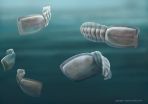(Press-News.org) Researchers from the University of Sheffield have found vital new evidence on how to target and reverse the effects caused by one of the most common genetic causes of Parkinson's.
Mutations in a gene called LRRK2 carry a well-established risk for Parkinson's disease, however the basis for this link is unclear.
The team, led by Parkinson's UK funded researchers Dr Kurt De Vos from the Department of Neuroscience and Dr Alex Whitworth from the Department of Biomedical Sciences, found that certain drugs could fully restore movement problems observed in fruit flies carrying the LRRK2 Roc-COR Parkinson's mutation.
These drugs, deacetylase inhibitors, target the transport system and reverse the defects caused by the faulty LRRK2 within nerve cells. The study is published today (15 October 2014) month in Nature Communications.
Dr De Vos, a Lecturer in Translational Neuroscience at the world-leading Sheffield Institute for Translational Neuroscience (SITraN), said: "Our study provides compelling evidence that there is a direct link between defective transport within nerve cells and movement problems caused by the LRRK2 Parkinson's mutation in flies."
Co-investigator Dr Alex Whitworth explained: "We could also show that these neuronal transport defects caused by the LRRK2 mutation are reversible.
"By targeting the transport system with drugs, we could not only prevent movement problems, but also fully restore movement abilities in fruit flies who already showed impaired movement marked by a significant decrease in both climbing and flight ability."
The LRRK2 gene produces a protein that affects many processes in the cell. It is known to bind to the microtubules, the cells' transport tracks. A defect in this transport system has been suggested to contribute to Parkinson's disease. The researchers have investigated this link and have now found the evidence that certain LRRK2 mutations affect transport in nerve cells which leads to movement problems observed in the fruit fly (Drosophila).
The team then used several approaches to show that preventing the association of the mutant LRRK2 protein with the microtubule transport system rescues the transport defects in nerve cells, as well as the movement deficits in fruit flies.
Dr De Vos added: "We successfully used drugs called deacetylase inhibitors to increase the acetylated form of α-tubulin within microtubules which does not associate with the mutant LRRK2 protein. We found that increasing microtubule acetylation had a direct impact on cellular axonal transport.
"These are very promising results which point to a potential Parkinson's therapy. However, further studies are needed to confirm that this rescue effect also applies in humans."
Dr Beckie Port, Research Communications Officer at Parkinson's UK, which helped to fund the study, said: "This research gives hope that, for people with a particular mutation in their genes, it may one day be possible to intervene and stop the progression of Parkinson's.
"The study has only been carried out in fruit flies, so much more research is needed before we know if these findings could lead to new treatment approaches for people with Parkinson's."
INFORMATION:
Notes to editors:
Reference:
Godena V K et al (2014) 'Increasing Microtubule Acetylation Rescues Axonal Transport And Locomotor Deficits Caused by LRRK2 Roc-COR Domain Mutations'. NatComms
For further information, or to speak with Dr De Vos or Dr Whitworth, please contact:
Monika Feigenbutz, Communications Officer at SITraN on 0114 222 2250 or email m.feigenbutz@sheffield.ac.uk.
Parkinson's UK
Every hour, someone in the UK is told they have Parkinson's.
It affects 127,000 people in the UK - which is around one in 500 of the population.
Parkinson's is a degenerative neurological condition, for which there currently is no cure. The main symptoms of the condition are tremor, slowness of movement and rigidity.
Parkinson's UK is the UK's leading charity supporting those with the condition. Its mission is to find a cure and improve life for everyone affected by Parkinson's through cutting edge research, information, support and campaigning.
For advice, information and support, visit http://www.parkinsons.org.uk or call our free, confidential helpline on 0808 800 0303.
The Sheffield Institute for Translational Neuroscience (SITraN)
SITraN is a world-leading centre for research into neurodegenerative diseases including motor neurone disease (MND/ALS), Parkinson's disease and Alzheimer's disease. The purpose-built facility uniquely allows the multidisciplinary collaboration of clinicians, scientists and health professionals to develop new treatments for the benefit of patients.
To find out more visit http://www.sheffield.ac.uk/sitran/
The University of Sheffield
With almost 26,000 of the brightest students from around 120 countries, learning alongside over 1,200 of the best academics from across the globe, the University of Sheffield is one of the world's leading universities.
A member of the UK's prestigious Russell Group of leading research-led institutions, Sheffield offers world-class teaching and research excellence across a wide range of disciplines.
Unified by the power of discovery and understanding, staff and students at the university are committed to finding new ways to transform the world we live in.
In 2014 it was voted number one university in the UK for Student Satisfaction by Times Higher Education and in the last decade has won four Queen's Anniversary Prizes in recognition of the outstanding contribution to the United Kingdom's intellectual, economic, cultural and social life.
Sheffield has five Nobel Prize winners among former staff and students and its alumni go on to hold positions of great responsibility and influence all over the world, making significant contributions in their chosen fields.
Global research partners and clients include Boeing, Rolls-Royce, Unilever, AstraZeneca, Glaxo SmithKline, Siemens and Airbus, as well as many UK and overseas government agencies and charitable foundations.
For further information, please visit http://www.sheffield.ac.uk
To find out more visit http://www.sheffield.ac.uk
For further information please contact: Amy Pullan, Media Relations Officer, University of Sheffield, 0114 222 9859, a.l.pullan@sheffield.ac.uk
To read other news releases about the University of Sheffield, visit http://www.sheffield.ac.uk/news
Effects of high-risk Parkinson's mutation are reversible
2014-10-15
ELSE PRESS RELEASES FROM THIS DATE:
Scientists discover carbonate rocks are unrecognized methane sink
2014-10-15
CORVALLIS, Ore. – Since the first undersea methane seep was discovered 30 years ago, scientists have meticulously analyzed and measured how microbes in the seafloor sediments consume the greenhouse gas methane as part of understanding how the Earth works.
The sediment-based microbes form an important methane "sink," preventing much of the chemical from reaching the atmosphere and contributing to greenhouse gas accumulation. As a byproduct of this process, the microbes create a type of rock known as authigenic carbonate, which while interesting to scientists was ...
Australians not prepared for dying with dignity
2014-10-15
Just 14 per cent of the population has an Advance Directive, or "living will", detailing their end of life treatment and care preferences, according to an article led by QUT Australian Centre for Health Law Research director Professor Ben White.
This research is from a joint University of Queensland, QUT and Victoria University study, supported by the Australian Research Council in partnership with seven public trustee organisations across Australia.
An Advance Directive is a legal document in which a person specifies what treatment or end of life care they want, when ...
Partisan lenses: Beauty lies in your political affiliation
2014-10-15
ITHACA, N.Y. – Have you ever noticed you find your candidate for political office more attractive than the opponent? New research from Cornell University shows you're not the only one.
"We showed pictures of familiar and unfamiliar political leaders to voters in two different samples and found that familiarity and partisanship each significantly influenced how candidates were perceived," said the study's lead researcher, said Kevin M. Kniffin, a postdoctoral research associate at Cornell's Dyson School of Applied Economics and Management. "For example, Democrats ...
Food labels can reduce livestock environmental impacts
2014-10-15
PULLMAN, Wash. – With global food demand expected to outpace the availability of water by the year 2050, consumers can make a big difference in reducing the water used in livestock production.
"It's important to know that small changes on the consumer side can help, and in fact may be necessary, to achieve big results in a production system," said Robin White, lead researcher of a Washington State University study appearing in the journal Food Policy.
WSU economist Mike Brady demonstrated that the willingness of consumers to pay a little more for meat products labeled ...
Ancient fossils confirmed among our strangest cousins
2014-10-15
More than 100 years since they were first discovered, some of the world's most bizarre fossils have been identified as distant relatives of humans, thanks to the work of University of Adelaide researchers.
The fossils belong to 500-million-year-old blind water creatures, known to scientists as "vetulicolians" (pronounced: ve-TOO-lee-coal-ee-ans).
Alien-like in appearance, these marine creatures were "filter-feeders" shaped like a figure-of-8. Their strange anatomy has meant that no-one has been able to place them accurately on the tree of life, until now.
In a new ...
Gene variants implicated ADHD identify attention and language deficits general population
2014-10-15
Philadelphia, PA, October 15, 2014 – Are deficits in attention limited to those with attention-deficit/hyperactivity disorder (ADHD) or is there a spectrum of attention function in the general population? The answer to this question has implications for psychiatric diagnoses and perhaps for society, broadly.
A new study published in the current issue of Biological Psychiatry, by researchers at Cardiff University School of Medicine and the University of Bristol, suggests that there is a spectrum of attention, hyperactivity/impulsiveness and language function in society, ...
Construction secrets of a galactic metropolis
2014-10-15
Galaxy clusters are the largest objects in the Universe held together by gravity but their formation is not well understood. The Spiderweb Galaxy (formally known as MRC 1138-262 [1]) and its surroundings have been studied for twenty years, using ESO and other telescopes [2], and is thought to be one of the best examples of a protocluster in the process of assembly, more than ten billion years ago.
But Helmut Dannerbauer (University of Vienna, Austria) and his team strongly suspected that the story was far from complete. They wanted to probe the dark side of star formation ...
Psychiatrist appointments hard to get, even for insured: Study
2014-10-15
Obtaining access to private outpatient psychiatric care in the Boston, Chicago and Houston metropolitan areas is difficult, even for those with private insurance or those willing to pay out of pocket, a new study by Harvard researchers shows.
The researchers, who posed on the phone as patients seeking appointments with individual psychiatrists, encountered numerous obstacles, including unreturned calls, wrong numbers and providers who were no longer taking new patients. They met with success in only one-quarter of their attempts, even after two tries.
These and related ...
Prostate cancer's penchant for copper may be a fatal flaw
2014-10-15
DURHAM, N.C. – Like discriminating thieves, prostate cancer tumors scavenge and hoard copper that is an essential element in the body. But such avarice may be a fatal weakness.
Researchers at Duke Medicine have found a way to kill prostate cancer cells by delivering a trove of copper along with a drug that selectively destroys the diseased cells brimming with the mineral, leaving non-cancer cells healthy.
The combination approach, which uses two drugs already commercially available for other uses, could soon be tested in clinical trials among patients with late-stage ...
Two-faced gene: SIRT6 prevents some cancers but promotes sun-induced skin cancer
2014-10-15
A new study published in Cancer Research shows SIRT6—a protein known to inhibit the growth of liver and colon cancers—can promote the development of skin cancers by turning on an enzyme that increases inflammation, proliferation and survival of sun-damaged skin cells.
Previously considered protective, SIRT6 is part of a family of seven proteins called sirtuins that help regulate genomic stability and prevent some of the genetic flaws associated with aging. SIRT6 helps repair DNA damage, which can lead to cancer. This study, in the journal's October 15 issue, ...

